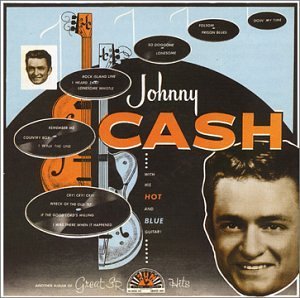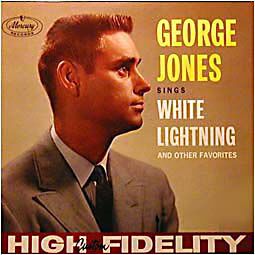
Carl Lee Perkins was an American guitarist, singer and songwriter. A rockabilly great and pioneer of rock and roll, he began his recording career at the Sun Studio, in Memphis, beginning in 1954. Among his best-known songs are "Blue Suede Shoes", "Honey Don't", "Matchbox" and "Everybody's Trying to Be My Baby".

Ernest Dale Tubb, nicknamed the Texas Troubadour, was an American singer and songwriter and one of the pioneers of country music. His biggest career hit song, "Walking the Floor Over You" (1941), marked the rise of the honky tonk style of music.

"Folsom Prison Blues" is a song by American singer-songwriter Johnny Cash. Written in 1953, it was first recorded and released as a single in 1955, and later included on his debut studio album Johnny Cash with His Hot and Blue Guitar! (1957), as the album's eleventh track. Borrowing liberally from Gordon Jenkins' 1953 song, "Crescent City Blues", the song combines elements from two popular folk styles, the train song and the prison song, both of which Cash continued to use for the rest of his career. It was one of Cash's signature songs. Additionally, this recording was included on the compilation album All Aboard the Blue Train (1962). In June 2014, Rolling Stone ranked it No. 51 on its list of the 100 greatest country songs of all time.

Sun Studio is a recording studio opened by rock-and-roll pioneer Sam Phillips at 706 Union Avenue in Memphis, Tennessee, on January 3, 1950. It was originally called Memphis Recording Service, sharing the same building with the Sun Records label business. Sun Studio is perhaps most famous for its role in the early years of Elvis Presley’s career.

The Tennessee Three was the backing band for singer Johnny Cash for nearly 25 years; he was known especially for his country/rockabilly style, although he won awards in numerous categories. In 1980, he reorganized the group, expanding it and naming it the Great Eighties Eight. The band provided the unique backing that would come to be recognized by fans as "the Johnny Cash sound."

"I'll Be Doggone" is a 1965 song recorded by American soul singer Marvin Gaye and released on the Tamla label. The song talks about how a man tells his woman that he'll be "doggone" about simple things but if she did him wrong that he'd be "long gone". The song was written by Miracles members Smokey Robinson, Pete Moore and Marv Tarplin, initially for The Temptations, who rejected the song.

Johnny Cash with His Hot and Blue Guitar! is the debut studio album by American singer Johnny Cash, released on October 11, 1957. The album contained four of his hit singles: "I Walk the Line," "Cry! Cry! Cry!," "So Doggone Lonesome," and "Folsom Prison Blues." It was re-issued on July 23, 2002, as an expanded edition, under the label Varèse Vintage, containing five bonus tracks, three being alternate versions of tracks already on the original LP. In 2012, Columbia Records reissued the album with 16 additional non-album Sun Records tracks as part of its 63-disc Johnny Cash: The Complete Columbia Album Collection box set. In 2017, 60 years after the original release, the album was remastered under the title Johnny Cash with His Hot and Blue Guitar! . In 2022, Sun released a remastered edition of the original studio album, with only the original track listing. The songs had been remastered as to simulate being in the studio as the tracks were recorded.
"Cold, Cold Heart" is a country music and pop song written and first recorded by Hank Williams. This blues ballad is both a classic of honky-tonk and an entry in the Great American Songbook.

"Million Dollar Quartet" is a recording of an impromptu jam session involving Elvis Presley, Jerry Lee Lewis, Carl Perkins, and Johnny Cash made on December 4, 1956, at the Sun Record Studios in Memphis, Tennessee. An article about the session was published in the Memphis Press-Scimitar under the title "Million Dollar Quartet". The recording was first released in Europe in 1981 as The Million Dollar Quartet with 17 tracks. A few years later more tracks were discovered and released as The Complete Million Dollar Session. In 1990, the recordings were released in the United States as Elvis Presley: The Million Dollar Quartet. This session is considered a seminal moment in rock and roll.
The Rock and Roll Trio were an American rockabilly group formed in Memphis, Tennessee, during the 1950s. They were also known as "Johnny Burnette and the Rock and Roll Trio" and the "Johnny Burnette Trio". The members of the Trio were Dorsey Burnette, his younger brother Johnny, and a friend Paul Burlison. Dorsey and Johnny Burnette were both natives of Memphis, having been born there in 1932 and 1934 respectively. Paul Burlison was born in Brownsville, Tennessee, in 1929, but moved to Memphis with his family in 1937.
"Home of the Blues" is a song co-written and recorded by American country music artist Johnny Cash. The song was recorded on July 1, 1957 in Memphis, Tennessee, and was released as a single in August the same year. It was also included as the eleventh track of his second album, Sings the Songs That Made Him Famous.
"I'm So Lonesome I Could Cry" is a song written and recorded by American country music singer-songwriter Hank Williams in 1949. The song has been covered by a wide range of musicians.

The Johnny Cash Sun Records discography details the music recorded by country music legend Johnny Cash and released on Sun Records. From late 1954 to July, 1958, Cash recorded for Sun Records, a label founded by Sam Phillips and located at Sun Studio in Memphis, Tennessee. Despite making his final recordings for Sun in 1958 and subsequently moving to Columbia Records, Phillips amassed sufficient backlog to continue to release new material by Cash in single and album format until as late as 1964.

Return to the Promised Land is a gospel music soundtrack and 80th overall album by American country singer Johnny Cash and his wife, June Carter Cash. The album was released in 2000 as the soundtrack to the 45-minute VHS video of the same title released in 1992 by Rev. Billy Graham's World Wide Pictures.

Dreaming My Dreams is the twenty-second studio album by American country music artist Waylon Jennings. The album was co-produced with Jack Clement and recorded at Glaser Sound Studio in Nashville, Tennessee, between February and July 1974.

White Lightning and Other Favorites is a studio album released by George Jones on May 26, 1959. Its title track "White Lightning" was a #1 Country hit in 1959.

Buddy Gene Emmons was an American musician who is widely regarded as the world's foremost pedal steel guitarist of his day. He was inducted into the Steel Guitar Hall of Fame in 1981. Affectionately known by the nickname "Big E", Emmons' primary genre was American country music, but he also performed jazz and Western swing. He recorded with Linda Ronstadt, Gram Parsons, The Everly Brothers, The Carpenters, Jackie DeShannon, Roger Miller, Ernest Tubb, John Hartford, Little Jimmy Dickens, Ray Price, Judy Collins, George Strait, John Sebastian, and Ray Charles and was a widely sought session musician in Nashville and Los Angeles.
Darrell Puckett, known professionally as Darrell Clanton, is an American country music artist. In the mid-1980s, he recorded for Audiograph and Warner Bros. Records, charting three singles on the Billboard country charts. The highest of the three was "Lonesome 7-7203," which reached No. 24 on the country charts in 1984.
"(I Heard That) Lonesome Whistle" is a song written by Hank Williams and Jimmie Davis. It became his fourteenth consecutive Top 10 single in 1951.
"Sweet Thang" is a song written and originally recorded by American country artist Nat Stuckey. It was Stuckey's first major hit as a music artist, peaking in the top ten of the national country music charts. In later years, it would notably be recorded by Ernest Tubb and Loretta Lynn.












